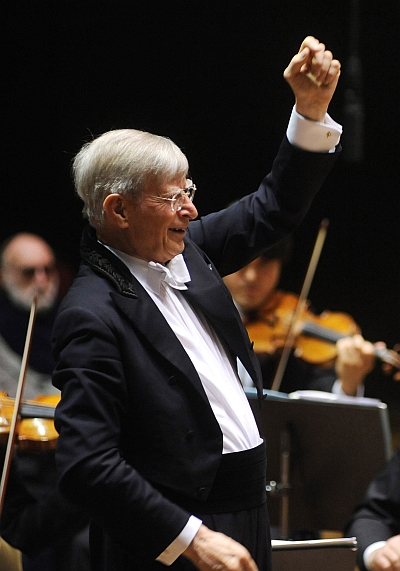 Switzerland Bruckner: Tonhalle Orchestra, Herbert Blomstedt (conductor), Tonhalle Zurich, 10.5.2012 (JR)
Switzerland Bruckner: Tonhalle Orchestra, Herbert Blomstedt (conductor), Tonhalle Zurich, 10.5.2012 (JR)
Bruckner: Symphony No. 8
I entertained high hopes for this concert; after all, Blomstedt is a recognised Brucknerian and an ardent champion of his works (he holds the Bruckner Society of America’s Medal of Honour) and at 85 is full of worldly wisdom. He is recording a Bruckner cycle and it is nearing completion. My hopes were however only partly satisfied as by the end of the symphony I felt that I heard a number of parts but not a satisfying whole.
Blomstedt comes over as a kind, ascetic and undemonstrative person (he is a devout Seventh Day Adventist) and his music-making reflects this. His conducting style, whilst remarkably vigorous for a man of his age, is not flamboyant. His reading of the symphony was leaner and more intimate than most, and I missed some of the intensity and colouring of, say, Haitink or Karajan, and some of the bounce of Günther Wand.
Blomstedt’s opening movement was a gradual build-up of visceral power, his arms swaying rhythmically; the Tonhalle is a relatively small concert hall (a traditional shoe-box) and the sound was quite deafening. After an uncontroversial Scherzo, Blomstedt slowed right down for the Adagio, fatally so. Bruckner marks it “Feierlich langsam, doch nicht schleppend” (solemnly slow, but do not drag), and it’s a very tricky dividing line. After a day of blistering 30-degree heat, I found the pace (or rather, the lack of it) simply too soporific. At times, in the middle of the movement, the performance almost stopped, Blomstedt appeared to have lost his way. The sloth removed all dramatic tension, although this did allow plenty of time for Blomstedt to reveal some of the textures, such as the glissandi of the three harps.
Only in the final movement did I feel that Blomstedt chose a very judicious tempo, and aided by a hard-hitting timpanist (Benjamin Forster) it was all pure power and force: the audience was quickly woken from its collective slumber. This was the most successful movement, although deafeningly loud even from my seat in the Balcony, at the very back of the hall; I spotted at least one cellist insert ear-plugs.
I am not going to discuss Bruckner versions, an esoteric and rather dull subject; this performance was a mixture of the two Haas versions dating from 1939 which had me confused at times and not entirely convinced.
The orchestra played well – though not quite on top form – for a conductor whom, judging by the stamping of their feet after the performance, they clearly admire and revere. At the end, Blomstedt didn’t look at all tired and probably went off to run a half-marathon.
John Rhodes
